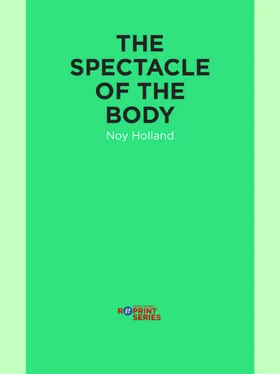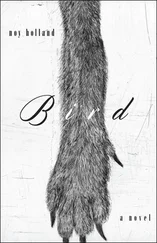They smelled like piss and horses. They lifted me up on the bandbox so I could almost see. But I did not see Daddy. I was on the bandbox, sitting, seeing over the hats of the men, but I could not see Daddy.
“Somebody tell Parson that his boy has found him here.”
But I could not hear Daddy.
On my hands, I could smell my shoes. I heard the thick flaps of the tent beat in the wind outside the tent and the boy walking out in the wind outside. I could hear my shoes. It was just the trees I heard and the wind that beat the flaps of the tent and the squeaking steps my shoes made and then the music started. It was just the one light when the music started. The light shined down along her. She had feathers in her hair, the girl, that flew out when she danced. She had a jerky way of dancing, a tooth that as she danced I saw her loosen with her tongue.
“Quit that,” Cissie says. “What is it now, Orbit?”
I pull the porch light on.
I say, “Oscar will not come tonight. Will he, Cissie? And Daddy not the next night?”
Not even if we hear the cares go quiet past out there. You cannot see the trees out there. Tonight the trees are quiet.
Even if that boy left him there to find his own way home from the fair, still there would be the road to cross, the slough, the stubbled field to cross — so even if Oscar came on, even if Oscar did not stop, it would be high time by then, by the time we maybe saw him, to polish our swapped shoes again to be on our way from home by then to see Clem at the fair.
There is not a leaf that turns. There is not a drop that falls. There are not the trees to see until the bright heat lights them.
“Is that all, then?” Cissie says. “That’s what you wanted to ask me?”
We leave the porch light burning.
Momma is in her room.
We try to go how Momma went when Momma could leave her room. We walk along the dirt road that quits against the paved road and the river runs on beside of lakes and takes the boats to sea. Ours is just a small boat. It is just a lake boat. It is not a boat to ride the river out to sea.
The river moves fast.
It sweeps beneath the limbs of the trees that bend along the broken bank.
The rain clouds stay at the river, at the crooked lake at the river left. Go on .
The pelicans go on.
We do not turn back. We go on walking down, catching onto the limbs of the trees to reach the high wall of the barge, the low rail of the sloping deck we use the chains to climb to. The chains come up from the river. We swing our feet up over them to monkey up the slope to the barge, the mud of our shoes dropping past into that passing river.
I say, “Be careful, Cissie.”
The river goes to sea. The sea ourselves we have not seen nor had the taste nor smell of. We lie on our backs on the deck of the barge. We lie so our heads hang away from the barge, listening to the river.
Say the river turns back.
“I saw a girl at the fair,” I say. “Her hair was kinked and yellow. It was not like your hair. I did not want to touch her hair.”
My hands were dirty. My hands smelled like Oscar smelled my hands smelled like Daddy — like the shoes I wore to the ticket booth, the eggs I threw to the whiskered fish, the necks I threw so I could flip the skiff so the snakes would not swim in it.
She danced. The men were hooting. They were calling for the next girl, calling for something else. She took her top off, her thin brassier. She took her time with her panties, tugging till they fell down, till they were on the floor. Then she quit dancing. She got down into the webby chair folded out in the swinging light. She let her legs drop open. She pushed the eggs up into her — three, I counted. Four. Maybe I lost count of them.
Maybe they were Doll’s thin eggs.
Maybe they were the kingbird’s eggs, crowning in the gash she dropped her legs apart to show us. She did not want to show us. She popped them out again. I saw her watching. I saw she could see me in the tent light there. She lobbed the eggs over the hats of the men. But I did not want to catch the eggs. I did not want to touch her skin, and not the small eggs that broke and left in her no shell I saw, no shut place she could open.
Say the river turns back.
Say the river turns back, sucking at the sea to turn, will the pelicans turn back also, Cissie? Will the salted fish turn back when the sea has turned back to run back into the sea itself in the turning river?
Go on. Our lake is our lake. Our barge is chained here. Go on.
The fair stays here for twelve days. Then is yet the next town I can think of that it goes to. Then the fair stays eight days. Then figure for the next small town as small by far as our small town, it stays for maybe ten days. I cannot figure. Maybe I lost count of them. I counted nine and seven — the nine eggs going into her, the seven coming out.
Plus there is this also — also to think how many times to figure in a fair night they can fill the tent to do it. It is not a big tent. And where they find the eggs she keeps, plenty more would come. Twelve, say, eight days, ten days spent in Little Crab, plus maybe days in towns to go I have not even thought of. So say another two towns. Say she does it twice a night, since maybe they won’t wait for her to let the tent get filled. She is seventeen, say, or maybe she is twenty. Maybe it is nothing you can start before you’re twenty. So maybe she is twenty. Couldn’t she be twenty?
Maybe it is not a redbird. It could be a kingfisher bird. Couldn’t it, Cissie? Because don’t the kingfisher birds steal bones to knit them on the water?
The bones could be our Bingo’s bones, the small bones of the birds she kills, the bones of Momma’s fingers.
Couldn’t they, Cissie?
Because maybe it is not a redbird.
Maybe it is a kingfisher bird.
Maybe it flies at the windowpane because kingfisher birds need bones and hair and there are the bones of Momma’s hands and the hair that falls from Momma’s head and the hair that falls from your own head and from my head also.
And we have bones also.
Her shoes were dirty. Momma’s skirt of her dress was dirty. I felt the cool where the skirt of her dress, where the cloth of her skirt, doubled back, dried from the river still. Our mouths were burning. The fireflies were burning.
“There now,” Cissie says.
“Let’s go now,” Cissie says. “Hum up, Orbit.”
The boats are moving. The lamplights are on. But we are not moving. We are not moving. Our beds are one bed. Our lake is our lake. Our barge is chained here. Go on. She is here with us now. She will die with us. Go on.
The bird came back when Orbit came back. I heard it hitting at the windowpane again.
It kept on at it. For a time I could not see it. I thought at first it was mud Orbit threw, but there was no mud to throw, no rain yet to pock the dust to clop against the windowpane so that I would lean across her bed and say through the window, Orbit? What is it now, Orbit?
But he did not throw it.
He was working at his tree.
His ax made hammering sounds working at his tree. The blade was shiny. The light that fell from Mother’s room, Orbit chopped the tree by. There were pieces chipped of the bark of the tree and of the pale wood of the tree scattered in Orbit’s shadow as if it were not his shadow but a still pond by some accident he had stepped in there.
He swung the ax back. He had choked up on the handle. I saw it slipping in his hands. The window sweated. I let it close then.
I saw the bird swoop down then from where it sat in the pin oak tree, where the filly shook in the pin oak tree when the iron head of the ax homed, and so I pushed it up again, the window, the shadow of the window sash lifting on my brother’s back — and the bird banked.
Читать дальше











